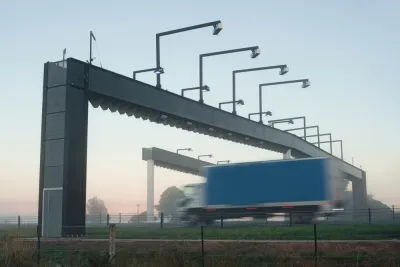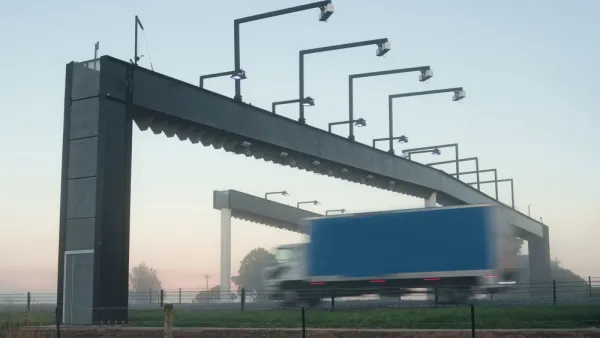The nation's sole truck-only tolling program survived its first lawsuit after a federal judge dismissed litigation brought by the American Trucking Associations, ruling that the proper venue was state court. ATA believes it is unconstitutional.

The ruling hands a victory to Rhode Island Department of Transportation Director Peter Alviti, who in August had filed a motion in the U.S. District Court for the District of Rhode Island to have the lawsuit dismissed, reports Eleanor Lamb for Transport Topics on March 20.
In his plea for the suit’s dismissal, Alviti cited the Tax Injunction Act [TIA], which restricts the power of federal district courts to prevent the collection or enforcement of state taxes, and the 11th Amendment of the U.S. Constitution.
Note that Chief Judge William E. Smith did not rule on the merits of the lawsuit, American Trucking Associations [ATA] v. Alvitia, Rhode Island Department of Transportation, filed in the same district court a month earlier, which dealt with the issue of whether the toll program “impedes the flow of interstate commerce.” Rather, his ruling dealt with the issue of court venue.
“The facts are clear that the fees, while dubbed tolls, are really a highly targeted and sophisticated tax designed to fund infrastructure maintenance and improvements that would otherwise need to be paid for by other forms of tax-generated revenue,” Smith’s decision said.
“As such, the court is without jurisdiction under the TIA; the federal case must be dismissed and ultimately heard in the courts of Rhode Island.”
Why truck-only tolls?
The court document notes that, according to the General Assembly, large trucks cause 70% of the damage to Rhode Island’s roads and bridges, but contribute less than 20% of the state’s annual revenue for infrastructure projects.
In neighboring Connecticut, new Democratic Governor Ned Lamont had campaigned on the issue of truck-only tolls, viewing Rhode Island as a model, but has since changed his position to include passenger vehicles in the toll schedule so as to capture more revenue.
Not giving up
Matt Cole, news editor for Commercial Carrier Journal, reports on March 21 that American Trucking Association will likely pursue their case in state court.
“ATA is reviewing the decision and considering next steps but looks forward to vindicating its underlying claims on the merits, whatever the venue," said ATA Deputy General Counsel Rich Pianka.
ATA claims that it is the selective manner in which the tolls are applied, not the fact that only heavy-duty trucks are being tolled, that violates the constitution's interstate commerce clause. Lamb explains:
Under Rhode Island’s toll system, a hauler within the state who needed to pass through one gantry repeatedly for dispatches would be charged less than a trucker moving through the state who encountered multiple gantries.
ATA’s lawsuit argued that truck tolls discriminate against interstate commerce. If a state charges a user fee for access to channels of interstate commerce, that fee has to be a fair approximation of use and cannot discriminate between in-state and out-of-state interests.
With the current litigation now resolved to the Rhode Island Department of Transportation's satisfaction, it remains to be seen how fast they can construct eleven tolling gantries to complete the truck-tolling system. A shortfall of revenue caused the department last month to cut $28 million from bicycle and pedestrian projects and trim $96 million from its highway repaving budget.
FULL STORY: Court Dismisses ATA’s Lawsuit Against Rhode Island Truck Tolls

National Parks Layoffs Will Cause Communities to Lose Billions
Thousands of essential park workers were laid off this week, just before the busy spring break season.

Retro-silient?: America’s First “Eco-burb,” The Woodlands Turns 50
A master-planned community north of Houston offers lessons on green infrastructure and resilient design, but falls short of its founder’s lofty affordability and walkability goals.

Delivering for America Plan Will Downgrade Mail Service in at Least 49.5 Percent of Zip Codes
Republican and Democrat lawmakers criticize the plan for its disproportionate negative impact on rural communities.

Test News Post 1
This is a summary

Test News Headline 46
Test for the image on the front page.

Balancing Bombs and Butterflies: How the National Guard Protects a Rare Species
The National Guard at Fort Indiantown Gap uses GIS technology and land management strategies to balance military training with conservation efforts, ensuring the survival of the rare eastern regal fritillary butterfly.
Urban Design for Planners 1: Software Tools
This six-course series explores essential urban design concepts using open source software and equips planners with the tools they need to participate fully in the urban design process.
Planning for Universal Design
Learn the tools for implementing Universal Design in planning regulations.
EMC Planning Group, Inc.
Planetizen
Planetizen
Mpact (formerly Rail~Volution)
Great Falls Development Authority, Inc.
HUDs Office of Policy Development and Research
NYU Wagner Graduate School of Public Service





























